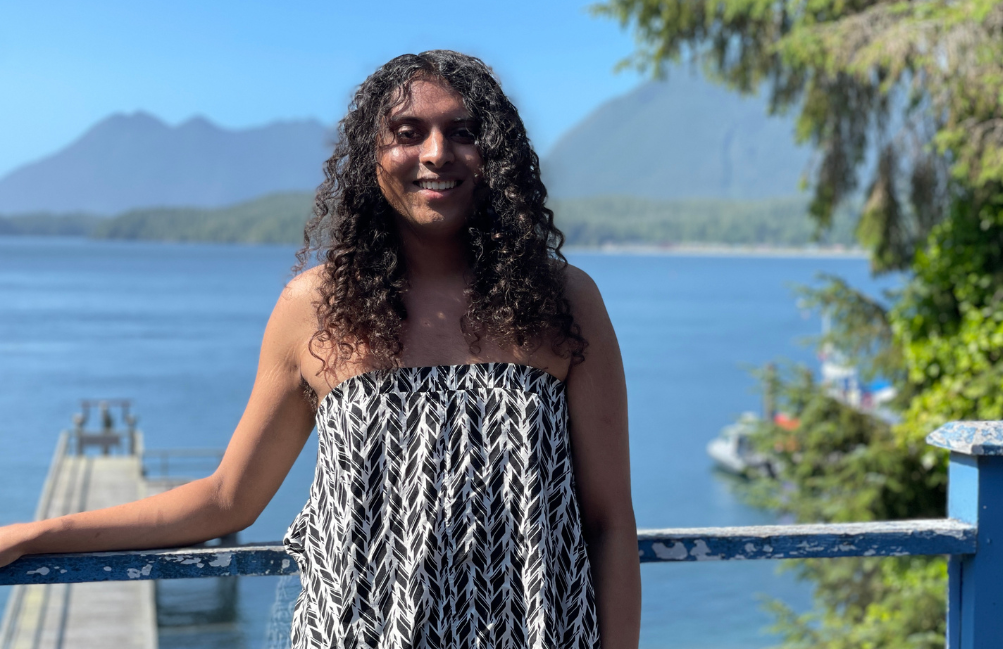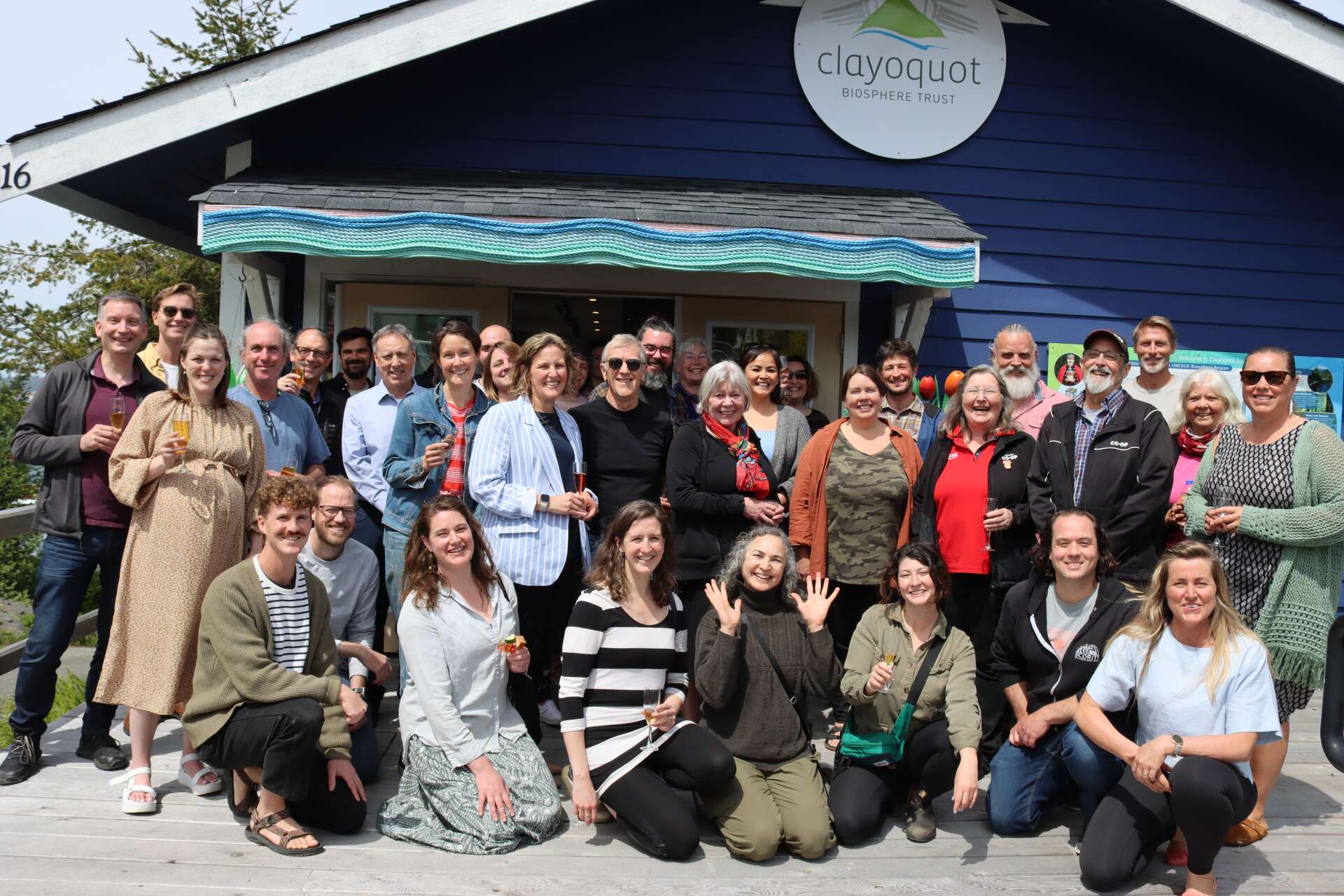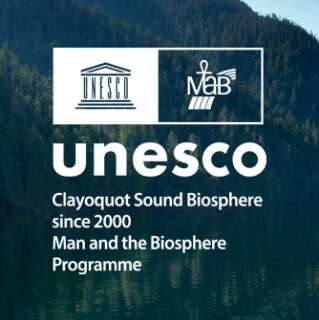Insights from our 2024 Intern: A Summer with the Clayoquot Biosphere Trust

This summer, we had the privilege of welcoming Zahur as CBT's 2024 summer intern, where they played a key role in supporting a variety of initiatives across the organization. Zahur brought fresh perspectives and a strong work ethic, making a meaningful impact on numerous projects. We’re incredibly grateful for their hard work and dedication! To learn more about Zahur's experience, read their blog post below.
* We deeply appreciate the Canada Summer Jobs wage subsidy program for partially funding this position and making this opportunity possible.
-----------------------------------
"As the outgoing 2024 Summer Intern at CBT, I am so grateful to have been able to spend my summer working alongside so many incredible people in this beautiful region.
I came across this opening at CBT through luck and a series of happy coincidences. My partner, having wrapped up an artist residency on Quadra Island, had decided to use a travel grant they’d received to work with the Coastal Queer Alliance (CQA) — a queer justice and advocacy group whose work they had been following for a number of years. I later discovered that the CQA is one of the many incredible organizations that have received CBT grants over the years. At that time, I started looking through the Alberni Valley Employment job board, hoping to find some sort of odd job while in the region. Instead, I stumbled across the internship posting from CBT and was struck by how well I felt the organization’s work and ethos aligned with my own interests.
During my undergrad at McGill University, on the other side of what’s currently called Canada, I got involved with campus campaigns for climate justice, food security, queer liberation and Indigenous sovereignty. At the same time, I was pursuing a degree in Linguistics – an academic passion that I have been interested in orienting toward Indigenous language revitalization. While I have long been invested in the countless intersections between these domains (the harmful extractive and colonial ways that linguistics has historically been practiced being one of many significant aspects), rarely had I come across an organization so clearly recognizing several of these intersections and supporting justice across them. I understand this broad outlook as owing much to the nuučan̓uł (Nuu-chah-nulth)philosophy of “hišukiš c̓awaak,” translated as “everything is connected” – words I have come to appreciate more and more with each passing day.
Among the many amazing people and projects I had the chance to work with, I was able to catalogue some of the many projects related directly or indirectly to food security which CBT has financially supported over the years – so far well over a hundred, not even counting the major sources of food-related funding through Neighbourhood Small Grants.
I also helped to re-catalogue and re-organize the organization’s impressive archive, a collection spanning decades of rich history that had suffered the effects of a flood but which is now hoping to find a new home at the soon-to-be-built Clayoquot Sound Biosphere Centre. We unearthed news articles, scientific reports, dissertations, meeting minutes, and more documenting the many aspects of the struggle to protect both old growth at Wanačas-Hiłḥuuʔis/“Meares Island” and the sovereignty of the ƛaʔuukʷiatḥ (Tla-o-qui-aht) and ʕaaḥuusʔatḥ (Ahousaht) Nations, tracing the development of the Clayoquot Biosphere Project research group and what would lead to the establishment of the CBT. This felt particularly special knowing that I’d had the luck to be here just as the new conservancies came into effect – in fact on my first day having arrived in Tofino – as an important (though not final) step finally enshrining the legacy of that struggle and many others into law.
I had the opportunity to participate in two beach cleanups organized with Surfrider Pacific Rim: an iteration of Washed Up Wednesdays (at which I counted somewhere around 200 cigarette butts!) in partnership with Tourism Tofino, and the annual Hands Across the Sands in partnership with Friends of Clayoquot Sound. The latter event included a screening of the beautiful new short film Warrior Spirit documenting the fight of Tsleil-Waututh water protector Will George against the TMX pipeline, which became operational this year, with Will George himself in attendance. The film skillfully interweaves George’s story with the Squamish story of a two-headed serpent. I recall one powerful moment at the event – aside from the many in the documentary itself – when Roxanne Charles-George (a Semiahmoo activist and Will George’s wife) reminded us of how much is extracted from the lands and waters of Turtle Island to fund the war machine, currently manifesting as support for devastation and genocide in Palestine.
Warrior Spirit followed a shorter feature on ƛaʔuukʷiatḥ resistance. In it, Elder Joe Martin mentions how in 1984 – the year of the declaration of Meares Island as a Tribal Park – chiefs from across what is currently known as BC came to show their support. In 2019, ƛaʔuukʷiatḥ held its own solidarity rally for the Wet’suwet’en Nation’s resistance to the Coastal GasLink pipeline, which is also now mechanically completed. Later in the summer while continuing with CBT remotely from Tio’tià:ke/Mooniyang (what’s currently called Montréal), I attended a screening of Yintah – a film about this same struggle – during its premiere tour, with Wet’suwet’en filmmaker and water protector Jennifer Wickham. Observing the parallels between the two stories was both beautiful and heartbreaking. By the time this is published, both Warrior Spirit and a shorter version of Yintah will be available to stream for free on CBC Gem, and the full-length version of Yintah will be available on Netflix starting October 18, 2024.
Even before knowing of CBT and the UNESCO Biosphere Region/Reserve program, I have been enamoured with the closely related concept of a bioregion. Bioregionalism encourages us to think about how we can work together to meet the needs of every organism within an area defined by the ecosystemic relationships involving us. These include watersheds and analogous concepts like foodsheds, along with ancestral relationships of Indigenous cultural groups to the land and other beings.
For several years I’ve been a fan and advocate of the Just Transition Framework for shifting our social, economic, and political systems to ones that are greener, regenerative, and work for everyone – a key component of which is moving our decision-making power toward bioregional governance. Clayoquot Sound is a beautiful example of why the biosphere region designation exists. This region can also be considered part of other nested bioregions: namely Cascadia and the even larger Salmon Nation Trust defined according to the historic prevalence of wild Pacific salmon and the Indigenous cultures that have key cultural and food-related relationships with it. Bioregions are a way to protect the beautiful amount of diversity present in our world: biodiversity, cultural diversity, linguistic diversity, gender diversity, neurodiversity, and so many more. What CBT does to support groups working across these focuses is what deeply attracted me to the organization and what continues to inspire me as I exit my role.
I would like to thank the CBT team for welcoming me and teaching me so much this summer, as well as all of their incredible work. The team also generously provided me with an extra monetary gift, which I am proud to be donating to Palestinian mutual aid efforts."
- Zahur Ashrafuzzaman (she/he/they)

